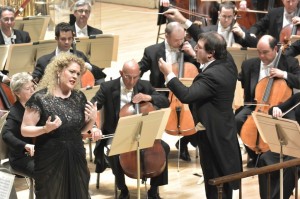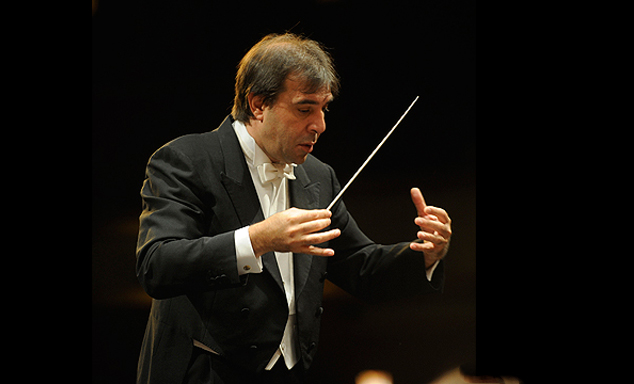Fuse Concert Review: Michelle DeYoung and the Boston Symphony Orchestra/Daniele Gatti
Daniele Gatti’s management of the orchestra—the unfolding of melodic lines and instrumental textures—was particularly noteworthy, matched here with a keen sensitivity to the music’s expressive detail: this was a riveting performance.
By Jonathan Blumhofer.

Soloist Michelle DeYoung, Daniele Gatti and the BSO performing Wagner at Symphony Hall. Photo: Stu Rosner
It may be one of the better-kept secrets of late in the orchestral world, but the Boston Symphony Orchestra (BSO) is one great Wagner band. Their affinity for Wagner’s music (which is somewhat ironic, considering the orchestra’s reputation as a preeminent purveyor of French repertoire) was on full display this weekend in a program celebrating the 200th birthday of the most important composer, chronologically, after Beethoven. Daniele Gatti conducted his second subscription series of the season, and Michelle DeYoung appeared in two brief but substantial operatic scenes.
In the past, I’ve found Gatti a frustrating conductor. I’ve now heard three of his six programs with the BSO (so far—he conducts a seventh next week). The first two were decidedly mixed: his Mahler Five in 2004 packed lots of energy but paid little heed to the music’s panoramic moments. In January his sluggish Verdi Requiem somehow managed to suck nearly all the life out of one of the most exciting pieces in the repertoire. Yet on Saturday night, he delivered, on the whole, a dramatic, arresting performance that will linger in the mind for some time to come. Go figure.
That Gatti and the BSO were in sync was clear from the downbeat of the program’s first half, which comprised just two pieces, “Dawn and Siegfried’s Rhine Journey” and “Siegfried’s Death and Funeral Music” from Götterdämmerung: timpanist Timothy Genis’s sotto vocissimo opening roll possessed an electricity one encounters rarely, but he was only tapping into a current the entire orchestra was plugged into.
These excerpts are the ultimate in symphonic opera, and Gatti grasped their Beethovenian roots, drawing a performance of sweeping grandeur in “Dawn and Siegfried’s Rhine Journey” and driving intensity in “Siegfried’s Death and Funeral Music.” His management of the orchestra—the unfolding of melodic lines and instrumental textures—was particularly noteworthy, matched here with a keen sensitivity to the music’s expressive detail: this was a riveting performance.
The intensity was a bit less in the Overture to Tannhäuser, which opened the second half of Saturday’s concert. Though a relatively early overture (dating from 1841; the opera premiered in 1845), it’s a marvelous tone poem and demonstrates Wagner’s youthful but formidable command of the orchestra as a vehicle for dramatic expression.
It’s also filled with tunes, and Gatti again drew a performance from the BSO that was breathtaking in its melodic sweep: the opening four-plus minutes unfolded with inevitability. Unfortunately, the Venusberg music that followed lacked any real spark or frenzy; this was music for a disappointingly chaste bacchanal. And the string playing turned ragged at the reprise of the “Pilgrim’s Chorus” that ends the Overture. But at least the melodic pacing returned then, even as the brass, in their zeal, occasionally covered the rest of the orchestra.
The Prelude to Act I of Lohengrin fared better. Among other things, this program demonstrated the fascinating ambiguity between Wagner the Progressive and Wagner the Traditionalist, and both characteristics are very present in this Prelude. The orchestration here is often visionary, no more so than in the division of the violins into eight solo parts. One of Wagner’s quintessential traits, the long, unfolding melodic writing—what he would later term unendliche (or endlose) Melodie—is ever present. Yet the harmonic language is decidedly mid-nineteenth-century Romantic: highly chromatic, yet, surprisingly, not moving too far from the home tonality.
Saturday’s performance well caught the music’s mystery and dramatic trajectory, though it felt a little rushed from time to time. Still, the sheer sound of the BSO—especially in the extended resolution to the Prelude’s climax—was numinous.
Satisfying as this program was, it’s unfortunate the BSO couldn’t celebrate Wagner’s birthday with a complete operatic performance (Act 3 of Die Walküre is apparently as near as we’ll get later this year at Tanglewood). The closest this program came to a full opera was with the Prelude and Liebestod from Tristan und Isolde, which closed the evening.

Conductor Daniele Gatti. On this occasion he delivered a dramatic, arresting performance that will linger in the mind for some time to come.
Compressing four hours of potions, deception, betrayal, love, and so forth into 20 minutes is a tall order to fill, but these two movements manage it pretty well. Gatti drew a reading of the Prelude that swooned. This is music that can (and probably should) crackle with more passion, but on Saturday Gatti’s unhurried approach did pack an expressive punch.
But it was the orchestral playing in the Liebestod that finally reconnected with the intensity of the Götterdämmerung excerpts of the first half. The BSO locked into this music in a very special way: its thick textures were rendered diaphanous, its counterpoint lucid, and—above all—its expressive content conveyed with fervor.
Michelle DeYoung, who had delivered a haunting account of Kundry’s narrative from Parsifal in between the earlier curtain raisers, returned for the Liebestod, but at this point, one actually wished that the BSO had opted for its purely orchestral version instead. Not that there was anything wrong with her account of Isolde’s “love death”: DeYoung’s singing was spot-on, even if her vibrato obscured some diction and the orchestra covered her at the big climax.
This program repeats Tuesday evening and, beginning Thursday, Gatti returns with Mahler’s sprawling Symphony no. 3. Based on this weekend’s results, these upcoming concerts merit some serious attention.
Tagged: Boston Symphony Orchestra, Daniele Gatti, Michelle DeYoung
